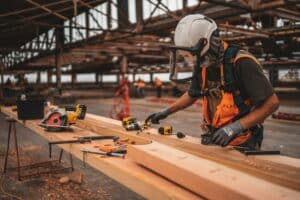Navigating the complexities of building regulations in Thailand is essential for anyone planning a construction project in 2024. Whether you are constructing a residential home, a commercial building, or a resort, understanding the local regulations can save time, money, and prevent legal issues. Thailand’s construction regulations are designed to ensure safety, environmental sustainability, and proper land use, which makes compliance necessary to complete any building project successfully.
Key regulatory bodies like the Department of Public Works and Town & Country Planning oversee construction activities and ensure compliance with building codes. These regulations were updated in 2024 to address new safety standards and environmental concerns, reflecting the country’s ongoing commitment to sustainable development.
In this article, we will help you understand the essential permits and documentation required for different types of construction, navigate zoning laws that affect land use, and follow environmental and safety regulations. Being well-informed about these aspects will ensure your project meets all necessary legal requirements, operates smoothly, and adheres to the highest standards of quality and safety. Whether you are a seasoned builder or a newcomer, this guide will provide valuable insights to manage your construction project in Thailand successfully.
Overview of Thailand’s Building Regulations
Key regulatory bodies play a significant role in ensuring that building practices in Thailand meet legal and safety standards. The Department of Public Works and Town & Country Planning is one such authority, overseeing the implementation of construction laws and enforcement of building codes. This department is responsible for issuing construction permits and conducting inspections to ensure compliance.
Specific requirements must be met to obtain construction permits in Thailand. The process typically begins with the submission of architectural plans and engineering designs to the local authorities. These documents must adhere to the standards and guidelines outlined by the regulatory bodies. Additionally, proof of land ownership and environmental impact assessments may be required, depending on the project’s size and location. Proper documentation, including safety measures and waste management plans, must also be submitted.
In 2024, recent updates to building codes have introduced stringent measures to enhance the safety and sustainability of construction projects. These updates emphasise the use of eco-friendly materials, energy efficiency, and improved structural resilience against natural disasters. Staying informed about these changes is crucial to ensuring your project remains compliant and does not face any legal hurdles.
Essential Permits and Documentation
Several essential permits and documents are required for various construction activities in Thailand. These include a building permit, an environmental impact assessment (EIA) permit, and specific permits for electrical and plumbing work. A building permit is mandatory for any construction activity and is granted only after thorough review and approval of the building plans by the local authorities.
Applying for these permits involves a systematic process. Firstly, you must prepare and submit detailed architectural and engineering plans and supporting documents. The local authorities will review these submissions to ensure compliance with building codes and zoning laws. Once the plans are approved, you will need to pay the requisite fees, after which the permits are issued. It’s advisable to engage with local consultants who are familiar with the Thai permitting process to expedite this step.
Compliance with all permit requirements is not just a legal obligation but a necessity for the smooth execution of your construction project. Failure to obtain the necessary permits can result in severe consequences, such as hefty fines, project delays, or even demolition of the constructed structure. Maintaining adherence to all regulatory requirements ensures your project progresses without any legal interruptions and is recognised as a safe and legitimate undertaking in Thailand.
Navigating Zoning Laws
Zoning laws in Thailand determine how land can be used and developed. These laws are designed to ensure that land use is organised and sustainable and to prevent conflicts between different types of land use, such as residential, commercial, and industrial. Each zone has its own set of regulations that dictate the types of buildings that can be constructed, their heights, and other specific requirements.
Zoning laws can significantly impact your construction project. They govern elements such as building height, distance from property lines, and allowable uses for the land. Failing to adhere to zoning laws can result in legal issues, project delays, and even the need to redesign your project. It’s essential to understand the zoning classification of your land before starting your project.
To ensure your project meets zoning requirements, start by consulting the local zoning maps and regulations. Engage with local authorities or a knowledgeable consultant to verify your understanding of the requirements. They can provide valuable insights and help you navigate any zoning restrictions, ensuring your project proceeds smoothly and complies with all legal standards.
Environmental and Safety Regulations
Environmental impact assessments (EIA) are crucial for large construction projects in Thailand. An EIA evaluates the potential environmental effects of a project before construction begins. This process includes reviewing the potential impacts on local ecosystems, water resources, and the community. The aim is to mitigate any negative effects and promote sustainable development.
Safety standards and regulations for construction sites ensure the well-being of workers and the public. These include guidelines for proper scaffolding, safe electrical installations, and mandatory use of personal protective equipment (PPE). Regular safety inspections are required to maintain compliance with these standards, reducing the risk of accidents and injuries on site.
Adhering to environmental and safety regulations involves best practices such as conducting thorough risk assessments, implementing effective waste management systems, and ensuring all workers are trained in safety protocols. By following these guidelines, you can minimise the environmental footprint of your project and create a safe working environment, contributing to the overall success and sustainability of your construction endeavour.
Conclusion
Understanding and complying with local building regulations in Thailand is essential for the success of any construction project. From obtaining necessary permits to navigating zoning laws and adhering to environmental and safety regulations, each step requires careful consideration and diligence. These regulations are designed to promote safety, sustainability, and orderly development, ensuring that your building project meets the highest standards.
If you need expert help navigating Thailand’s construction and building regulations, consider reaching out to CJ Samui Builders. Our experienced team is ready to assist you in every step of your construction project. Contact us today to ensure your project is compliant, safe, and successful.




